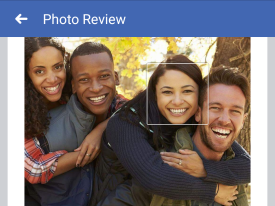Facebook Expands Use Of Facial Recognition To ID Users In Photos

Facebook is expanding its use of facial recognition software to alert users when photos of them are posted on the platform — whether or not they are tagged in the photo.
By default, Facebook users in the U.S. will be signed up for these face recognition alerts, unless they have previously opted out of a similar, more limited feature. But users can turn off face recognition, Facebook says.
Additionally, the company says it will roll out new tools to alert users if someone else may be impersonating them with a misleading profile photo.
Facebook has been using facial recognition technology since 2010 to detect faces in photos and look for recognizable patterns to identify individuals. Facebook had the ability to pair names with faces thanks to the “tag photos” feature, which people use to label themselves and their friends in pictures. The tags act as links to the Facebook profiles of those in the photo.
For years, the social media giant has offered “tag suggestion.” When a Facebook user uploaded a photo, the user would have the option of tagging the photo or labeling the people in it. Using its data on previous tags, Facebook would prompt the user uploading the photo to add more tags, using facial recognition to suggest people it recognized. Those who were tagged were sent notifications.
Now, Facebook is cutting out the human element of that process. If facial recognition software identifies you in a photo, you’ll be automatically notified — no need for the person who posted the photo to approve a tag.
This is only true for photos you are able to see. If a stranger adds a photo of you and makes it visible to just their friend group, you wouldn’t be notified, for instance.
There are two related features that Facebook is planning to roll out soon.
“We want people to feel confident when they post pictures of themselves on Facebook so we’ll soon begin using face recognition technology to let people know when someone else uploads a photo of them as their profile picture,” Joaquin Quiñonero Candela, the director of applied machine learning at Facebook, writes in a blog post. “We’re doing this to prevent people from impersonating others on Facebook.”
Facebook will also use facial recognition to describe photos to people with visual impairments, “even if people aren’t tagged,” Candela writes.
Users will be able to turn off all facial recognition features in their settings, under an option called “Face Recognition,” with just two options: yes and no. If you want to opt out, choosing “no” will keep Facebook from identifying your face to you and others based on face recognition. But it doesn’t stop Facebook from looking for other people’s faces in your photos.
Before that option becomes available, you can achieve the same thing by turning off tag suggestions in your Facebook settings.
The new option is not available in Canada and the European Union, Facebook notes, without explanation.
Regulators in both markets have previously raised concerns about the security and privacy implications of automatic facial recognition.
Under Canada’s privacy and personal information laws, all users must meaningfully consent to use of their personal information, and security must be safeguarded.
In the EU, Facebook’s “tag suggestion” feature was previously found to violate privacy laws because it was opt-out instead of opt-in, raising questions about consent.
More recently, Facebook’s Moments photo app was rolled out separately in the EU and Canada to leave out facial recognition technology.
You might be wondering: “Should I be afraid of face recognition technology?”
Facebook certainly assumes you’re asking that question. That was the title of a corporate blog post Tuesday from deputy chief privacy officer Rob Sherman, who noted that face recognition can be used both for innocuous reasons like sorting photos, as well as in “concerning ways.” It also acknowledged the “potential for racial bias.”
Sherman wrote that Facebook has “no plans” to roll out features that “tell strangers who you are,” and emphasized users’ ability to opt out of the feature.
If you are, in fact, wondering if you ought to be afraid, you might want to check out a more skeptical view of Facebook’s privacy practices from privacy watchdog group EPIC.
The Government Accountability Office also examined the question of facial recognition technology in 2015 and found that “no federal privacy law expressly regulates commercial uses of facial recognition technology.”
9(MDAxODM0MDY4MDEyMTY4NDA3MzI3YjkzMw004))





